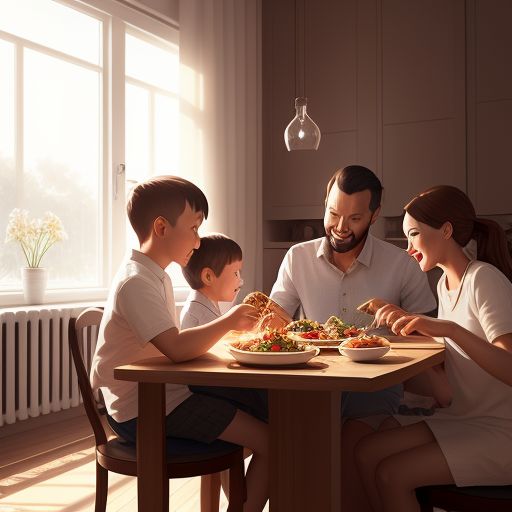Nurturing Strong Bonds and Empowering Children

About to have dinner with my wife and daughter and a thought sinked in, what is the importance of having a family dinner together? In today’s fast-paced world, where everyone seems to be constantly busy and connected to their digital devices, carving out quality family time has become more crucial than ever. Among the various opportunities for bonding, dinner time holds a special place in fostering strong relationships and positively impacting a child’s development. That’s the Power of Family Time.
In this post, let us explore the importance and effects of family time during dinner. Highlighting its role in creating lasting memories and nurturing a child’s emotional, social, and intellectual well-being.
Nurturing Emotional Connections
Family dinners offer a unique space for family members to connect on an emotional level. It is a time when parents and children can engage in meaningful conversations, share stories, and express their thoughts and feelings. This regular interaction promotes a sense of belonging, trust, and security, allowing children to develop strong emotional bonds with their family members. They learn that their opinions are valued, their experiences are heard, and their emotions are acknowledged, fostering a positive self-image and emotional well-being.
Strengthening Communication Skills
Regular family dinners provide an opportunity for children to improve their communication skills. As children actively participate in conversations, they learn to articulate their ideas, listen attentively, and respect others’ opinions. Engaging in discussions with family members also exposes them to a wide range of topics, broadening their knowledge and perspective on various subjects. These enhanced communication skills acquired during family dinners can significantly benefit children in their personal relationships, academic pursuits, and future careers.
Cultivating Healthy Eating Habits
Family dinners serve as an ideal setting to promote healthy eating habits in children. When parents model good eating behaviors and serve nutritious meals, children are more likely to adopt similar choices. Eating together as a family encourages children to try new foods, establish a balanced diet, and develop a positive relationship with food. Furthermore, research suggests that children who regularly have family dinners are less likely to engage in unhealthy eating behaviors, such as excessive snacking or consuming fast food.
Enhancing Academic Performance
The benefits of family time during dinner extend beyond emotional connections and healthy habits. Numerous studies have shown a positive correlation between regular family dinners and improved academic performance in children. The engaging conversations and intellectual stimulation during mealtime contribute to a child’s vocabulary development, critical thinking abilities, and general knowledge. Additionally, the undivided attention and support received from parents during these dinners can boost children’s self-confidence and motivation, leading to better educational outcomes.
Instilling Family Values and Traditions
Family dinners provide an opportunity to pass down family values, traditions, and cultural heritage from one generation to another. As children witness and actively participate in family rituals, they develop a sense of identity and belonging. These traditions not only foster a strong bond with their immediate family but also create a connection with their extended family and ancestors. The lessons and values learned during family dinners become an integral part of a child’s character, guiding their behavior, decision-making, and relationships throughout their lives.
In today’s busy world, family time during dinner often takes a backseat to other commitments. However, recognizing its profound impact on a child’s development can motivate parents to prioritize this essential bonding opportunity. Regular family dinners nurture emotional connections, enhance communication skills, cultivate healthy eating habits, boost academic performance, and instill family values and traditions. The power of family time and effort into shared meals, parents can create a nurturing environment that empowers their children and lays the foundation for a happy, well-rounded future.
How about you guys, what do you think? Is it important or not, to have a family dinner together? Of course, we have different situations and cultures. Let me know in the comment section.
Click the links for more of Personal Thoughts, Family & Parenting and Love & Relationship.
Leave a Reply